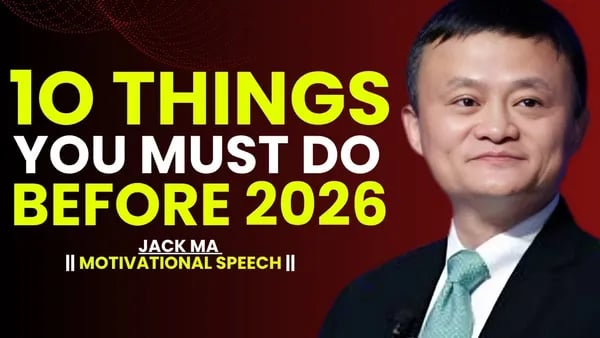You ever have one of those mornings when your coffee tastes like a warning sign? That was me last week, sitting with a stale croissant, scrolling past travel reels and skill upgrade ads, and it hit me—2026 isn’t a distant buzz, it’s peeking right around the corner. Suddenly, the thought of rolling into the next year on autopilot? Nope, not an option. So, let’s gut-check life, step off the hamster wheel, and map out moves so bold (yet doable) you’ll laugh at how predictable last year’s ‘resolutions’ look. What follows is not just another productivity pep talk—these are the offbeat, honest steps you’ll actually remember. Ready to get a little uncomfortable? Let’s jump in.
1. Stop Waiting for Permission – Skill Up On Your Terms
Let’s get one thing straight: the world isn’t going to pause and ask if you’re ready before it changes. It just changes. “The world will never ask your permission before it changes. It will just change.” That’s not just a catchy quote—it’s reality. If you want to thrive in the next few years, you need to take charge of your own skill development and embrace continuous learning before the workplace leaves you behind.
Think about it. Ten years ago, hardly anyone thought AI prompt engineering or social media marketing would be real jobs. Now, they’re everywhere. The most in-demand roles didn’t even exist a decade ago. That’s why effective skills acquisition is less about ticking off boxes for your résumé and more about building real confidence and flexibility. You’re not just collecting certificates—you’re future-proofing yourself.
Why Self-Directed Learning Is Your Superpower
Here’s the honest truth: nobody cares more about your growth than you do. Waiting for your boss to send you to a workshop or for your university to offer the perfect course? That’s a recipe for standing still. The key is self-directed learning. You choose the skills. You set the pace. You decide what matters for your goals.
- Want to start an online business? Dive into copywriting, ecommerce, and video editing.
- Dream of becoming a leader? Focus on public speaking, negotiation, and people management.
- Curious about tech? Explore data analytics or AI tools.
You’re not limited by your degree or job title. The skills you pick up now can help you pivot—no boss or diploma required. Take responsibility for upgrading yourself. Choose skills that align with your dreams, not just your current job description.
Small Steps, Massive Impact
Here’s the magic formula: 30 minutes a day. That’s it. Squeeze in a podcast about data analytics while you cook. Watch a YouTube tutorial on public speaking between Netflix episodes. If you stick with it, that’s about 182 hours of new learning in a year. Imagine what you could master in that time.
Research shows that most professional development happens on the job—about 70% of skill growth comes from real-world experience. But you can supercharge this with deliberate practice: break big skills into smaller parts, get feedback, and push yourself a little more each time. This approach leads to faster mastery and deeper confidence.
Real People, Real Results
Let me give you a quick example. My friend Sara studied biology in college. She had zero background in media. But she was curious about travel and storytelling. So, she started learning video editing online, just 30 minutes here and there. Now? She runs a successful travel channel—no formal training, just relentless, self-directed learning. That’s the power of taking charge.
What’s Next?
The workplace won’t wait for you to catch up. It’s evolving—fast. The only way to stay ahead is to make skill development a daily, non-negotiable habit. Pick a skill that excites you. Dedicate time every day. Don’t wait for permission. Start now, and by 2026, you’ll be amazed at how far you’ve come.

2. Health is Your Secret Weapon—Build Habits, Not Excuses
Let’s get real: nobody gets bonus points for running on empty. In the race for work readiness and professional development, your body isn’t just along for the ride—it’s the vehicle. If you neglect your health, you’re basically trying to win a marathon on a flat tire. Your body is your real home. If your body breaks down, everything else becomes useless.
Too many people sacrifice their health for career gains, only to spend years (and a fortune) trying to get it back. That’s not a growth mindset—it’s a recipe for burnout. The truth is, strong health habits are the ultimate long-term investment. They’re the foundation for time management, focus, and the energy you need to actually apply all those new skills you’re learning.
Start Small—Build Habits That Stick
You don’t need to overhaul your whole life overnight. Start with tiny, doable tweaks:
- Swap soda or energy drinks for water. Hydration is underrated, but it’s a game-changer for your energy and focus.
- Take walk breaks—yes, even if it’s just around your living room or office. Movement is life. The moment you stop moving, you start dying slowly.
- Stretch between calls or meetings. It keeps your body awake and your mind alert.
Research shows that even small changes—like drinking enough water daily or adding a 10-minute walk—can drive massive improvements in productivity and well-being. You don’t need a gym membership to get started; just move more, sit less, and fuel your body with clean food.
Eat to Fuel, Not Just to Fill
It’s easy to eat whatever’s quick or comforting, especially when you’re busy. But if you want to level up your professional development, you need to eat to fuel your mind and body, not just your cravings. Avoid processed foods as much as possible. Respect your body enough to give it what it truly needs, not just what your taste buds demand.
Think of it this way: every meal is a vote for your future energy, focus, and resilience. The more you choose real, nutritious food, the more you’re investing in your own growth mindset.
Sleep Is Not Optional
Here’s a confession: I once tried to power through a week on five hours’ sleep a night. I thought I was being productive—until two days later, I left my keys in the freezer. Don’t be that person.
Sleeping less isn’t a badge of honor; it’s a sign of ignorance. Your brain and body repair themselves during sleep. Chronic sleep deprivation silently sabotages your time management, creativity, and ability to learn new skills. If you want to be ready for anything work throws at you, value real sleep.
Mental Health Is Part of the Equation
Physical health is only half the story. Your mental health matters just as much. Take solo walks. Journal your thoughts. Spend time in silence, reflecting on your day. Meditate or pray if that gives you peace. And—this is big—spend less time with toxic people or in stressful environments. Your mind affects your body, and vice versa.
Balanced learning frameworks like Google’s 70:20:10 model remind us that real growth happens when you combine practical experience, feedback, and formal learning. But none of that matters if you’re running on fumes. Time management isn’t just about blocking hours for work—it’s about making space for rest, movement, and reflection, too.
"Your body is your real home. If your body breaks down, everything else becomes useless."
Build habits, not excuses. Your health is the secret weapon that powers every other move you make.

3. Build Wealth Under the Radar—Skip the Show, Own the Assets
Let’s get real about building wealth. It’s not about flashy cars, designer sneakers, or posting your latest “win” on social media. True financial freedom is quiet. It’s the kind of security that lets you sleep soundly at night, knowing you and your family are covered—no matter what life throws at you. If you’re aiming for career success and long-term professional development, this is the foundation you can’t afford to skip.
"Saving is not about how much you earn. It is about how much discipline you have."
Most people believe that earning more money will automatically lead to saving more. It’s a comforting thought, but it’s not true. If you can’t save when you’re earning a little, you won’t magically start saving when you earn a lot. The real game-changer? Discipline. Start with just 5–10% of your income. That’s it. The amount isn’t as important as the habit. Tiny, regular savings build the muscle you’ll need to handle bigger amounts later in your journey.
Start Small, Start Now
Think of saving as your first step toward professional development. It’s not about waiting for a windfall or the “perfect” time. It’s about starting where you are. Even if it feels insignificant, that 5–10% is your ticket to building a future where you call the shots. Research shows that setting SMART goals—specific, measurable, achievable, relevant, and time-bound—can make this process stick. For example, “I will save 7% of my monthly income for the next 12 months” is a goal you can track and celebrate.
Make Your Money Work—Not Just Sit
Saving is step one, but don’t let your hard-earned cash snooze in a low-interest account. You want your money to work as hard as you do. That’s where investing comes in. You don’t need to be a Wall Street wizard. Start with simple, safe options: mutual funds, ETFs, or government bonds. These tools are designed for everyday people and can offer stable returns. The real magic? Compounding. The earlier you start, the more time your money has to quietly multiply in the background—no drama, no spotlight, just steady growth.
- Set up automatic transfers to your savings or investment account each payday.
- Research beginner-friendly investment options in your country.
- Track your progress with a simple spreadsheet or budgeting app.
Skip the Show—Focus on Real Wealth
Here’s the secret: Real wealth is invisible to Instagram. It’s not about showing off. It’s about having choices. When you build assets, you’re creating a safety net for the days you can’t—or don’t want to—work. You’re also giving yourself the power to seize opportunities when they come, whether that’s starting a business, taking a sabbatical, or supporting your family in a crisis.
Studies indicate that most professional development happens on the job, but your financial development happens behind the scenes. It’s the quiet, consistent choices that set you up for career success and give you the time management freedom to pursue what matters most. Don’t wait for the perfect moment. Start small, stay consistent, and let your money do the heavy lifting—while you focus on building a life that’s rich in every sense of the word.

4. Collect Stories, Not Just Stamps—Travel and Broaden Your Perspective
Let’s be honest: nothing shakes up your mindset quite like stepping into a place you’ve never been before. Whether it’s a bustling city corner you’ve always ignored, a sleepy village a few hours away, or a mountain trail that’s been calling your name, travel is about more than ticking destinations off a list. It’s about collecting stories—real, vivid, sometimes messy stories that stick with you and shape your growth mindset for years to come.
Why does travel matter so much for continuous learning and career growth? Because it busts you out of your mental ruts. Even a short trip can jolt you out of your routine and force you to see the world—and yourself—differently. Suddenly, your problems shrink. Your city feels smaller. Your perspective widens. You realize people live, think, and thrive in ways you never imagined. That’s not just good for your soul; it’s rocket fuel for your creativity and adaptability.
Travel Mishaps: The Best Teachers You Never Asked For
Here’s the thing: travel rarely goes as planned. You’ll miss a bus. You’ll get lost. You’ll order something you can’t pronounce and end up loving it (or not). But these mishaps? They’re gold. Every missed connection, every awkward conversation in a new language, every detour—they all teach you adaptability, problem-solving, and humility. Research shows that practical application—actually doing, not just reading or watching—solidifies learning. When you’re out there, navigating the unknown, you’re not just learning about a place. You’re learning about yourself. You’re building confidence to handle whatever life throws at you, both at work and beyond.
You Don’t Need a Passport to Shift Your Mindset
Maybe you’re thinking, “I can’t afford to travel right now.” Good news: you don’t need a passport or a plane ticket to experience the benefits. Start small. Explore a neighborhood you’ve never visited. Take a train to a nearby town. Visit a local museum, a historical site, or a mountain you’ve only seen in pictures. The point isn’t distance—it’s difference. Each new experience chips away at limiting beliefs and cultivates resourcefulness, two key ingredients for career growth and a true growth mindset.
- Meet people with different stories. Listen. Absorb. Let their perspectives broaden your empathy and gratitude.
- Notice how others live with less—or thrive with more. It’ll make you appreciate what you have and inspire you to do more with it.
- Collect memories, not things. Years from now, you won’t remember the gadgets you bought, but you’ll remember the sunrise you watched from a mountaintop, the meal you shared with strangers, the laughter echoing in a place far from home.
"Traveling expands your thinking in a way books and lectures cannot."
Here’s a challenge: before 2026, promise yourself at least one trip to somewhere new. It doesn’t matter how close or far. Let it upend your routine thinking, spark your creativity, and give you stories you’ll carry for life. Because, as studies indicate, it’s the real-world experiences—the practical application—that lead to deeper understanding and lasting growth. And who knows? That one trip might just be the game-changing move your career and mindset need.
5. Create Your Own Legend—Personal Brand and Mentorship
Let’s be honest: in today’s world, people don’t just buy services or skills—they buy trust, stories, and reputation. That’s why building your personal brand is one of the most powerful Skill Development Strategies you can invest in for long-term career growth. As the saying goes,
"Your personal brand is what people say about you when you are not in the room."
Your personal brand is your invisible opportunity magnet. It’s not just about what you do, but how you do it—and how you share it. Whether you’re an employee, entrepreneur, student, or artist, your brand is your identity in the minds of others. It opens doors that qualifications alone can’t. So, what do you stand for? What are your strengths, your expertise, your story?
Here’s the thing: people connect with stories, not just achievements. When you share your journey—your wins, your struggles, your lessons, and your vision—with authenticity, you build trust. And trust is the foundation of influence. Influence, in turn, creates new opportunities. I’ve seen it firsthand: when I started posting what I was learning about tech careers, job offers started finding me, not the other way around. That’s the magic of a strong personal brand.
But building your brand isn’t just about being visible online. Sure, use social media wisely—share knowledge, insights, and ideas that help others. If you’re in business, talk about your industry. If you’re a student, share what you’re learning. If you’re an artist, let people in on your creative process. The more value you give, the more you’re seen as an authority in your field. But don’t forget: your offline presence matters just as much. Your attitude, discipline, communication style, and how you treat others all shape your brand. Every promise you keep, every respectful interaction, adds to your reputation. Your brand is your responsibility—own it.
Now, let’s talk about mentorship. Research shows that mentorship accelerates growth. Having a mentor gives you industry-specific guidance, real-world advice, and access to valuable professional networks. A mentor is someone who’s walked the path you want to walk. They’ve made mistakes, learned lessons, and discovered shortcuts that can save you years of struggle. Their wisdom helps you make better decisions, avoid unnecessary risks, and move forward with clarity and confidence.
But here’s a secret: mentorship isn’t just top-down. You don’t need to chase after big-name celebrities or industry leaders. A mentor can be anyone a step ahead of you—a senior, a teacher, a colleague, even someone you follow online whose advice you actually apply. The key is to stay humble, ask questions, and act on their guidance. Mentors want to help people who are serious about learning and growing.
And don’t underestimate the power of becoming a mentor yourself. Teaching others is one of the most effective Skill Development Strategies out there. When you guide someone else, your own understanding deepens. You spot gaps in your knowledge and work to fill them. You build leadership skills, patience, and empathy. There’s a unique fulfillment in seeing someone grow because of your support. Studies indicate that teaching and peer coaching create a robust learning ecosystem—one that benefits both mentor and mentee.
So, if you want to future-proof your career growth, start building your legend now. Share your story. Give generously. Seek out mentors and be one for others. In the end, your personal brand and your impact on others will be your greatest legacy—and your most powerful opportunity engine.




